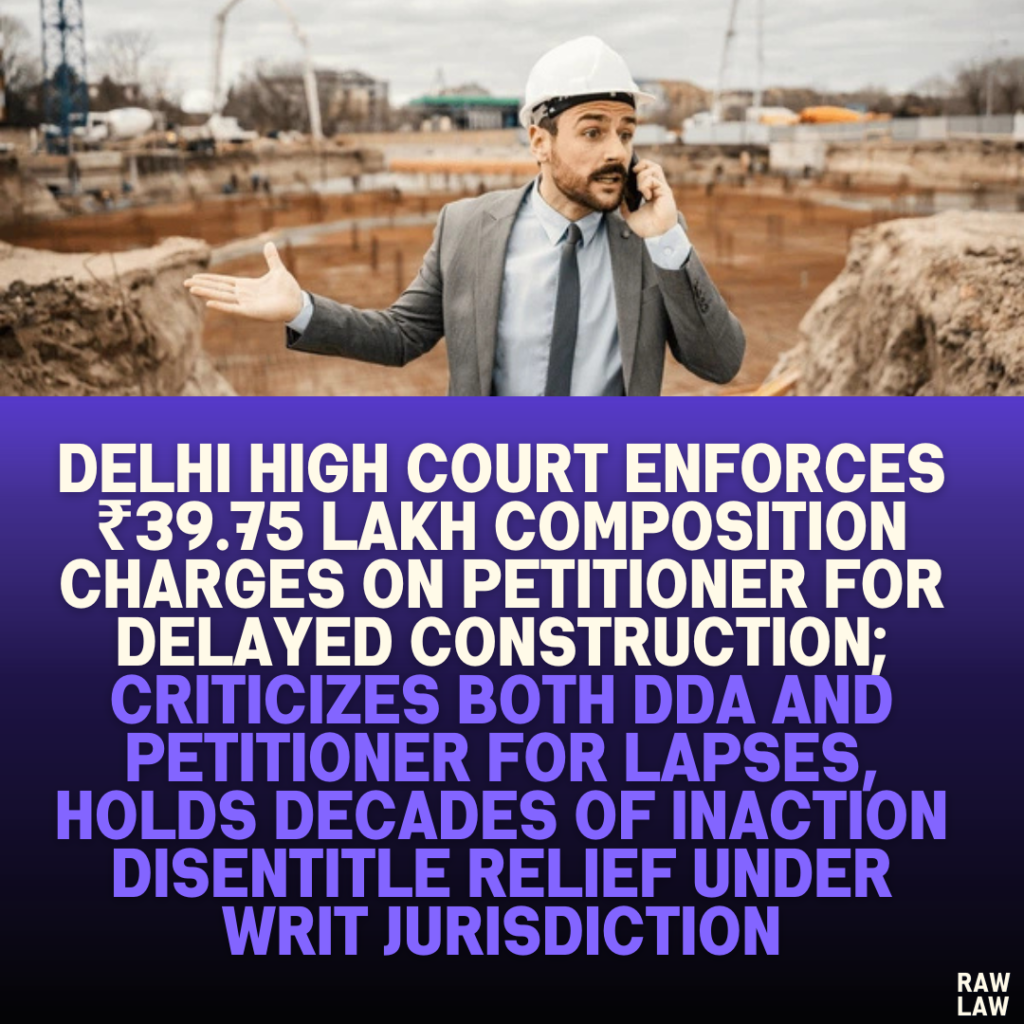Court’s Decision:
The Delhi High Court dismissed the writ petition filed by the petitioner, holding them liable to pay composition charges amounting to ₹39,75,657 for the delay in construction on the allotted plot. The court observed that the petitioner failed to act diligently and allowed critical periods of inaction to lapse, thereby disentitling them from relief. The court further stated, “The unexplained delay and laches on the part of the petitioner firm in espousing its legal rights, if any, qua the plot in question, itself nonsuits the petitioner firm.”
Facts:
- Initial Allotment:
- The DDA allotted a plot to the petitioner (part of a partnership firm) in 1969. However, the petitioner failed to pay the required premium, leading to the cancellation of the allotment in 1970.
- The allotment was restored in 1977 after the petitioner paid restoration charges.
- Change in Constitution:
- The petitioner transitioned to a sole proprietorship in 1971 and sought the DDA’s recognition of this change. Disputes among the partners delayed this process.
- The DDA only formally recognized the petitioner as the sole proprietor in 2001 after resolving these disputes.
- Urban Land Ceiling Act Complications:
- The Urban Land (Ceiling and Regulation) Act required a No Objection Certificate (NOC) for construction on the plot. The petitioner claimed they couldn’t obtain the NOC because the DDA failed to execute a lease deed.
- The petitioner pursued this for decades, but the Act was repealed in 1999, and no construction occurred even after the repeal.
- Composition Charges:
- The DDA raised a demand for composition charges for delayed construction, citing policies that penalize allottees for failing to utilize allotted land within stipulated timeframes.
Issues:
- Whether the petitioner was justified in claiming exemptions from composition charges due to the DDA’s delays.
- Whether the petitioner’s inaction over decades disentitled them from relief.
Petitioner’s Arguments:
- Blame on DDA:
- The petitioner argued that the delay in construction was entirely due to the DDA’s failure to execute the lease deed and delays caused by the Urban Land Ceiling Act.
- Exclusion of Periods:
- The petitioner contended that periods during which litigation and statutory requirements caused delays should be excluded when calculating composition charges.
- Unjust Demand:
- The petitioner relied on precedents where courts excluded such delays from penalty calculations, particularly emphasizing litigation periods and statutory hurdles.
Respondent’s Arguments (DDA):
- Negligence by the Petitioner:
- The DDA argued that the petitioner failed to submit essential documents despite repeated reminders between 1973 and 1987. This failure delayed the execution of the lease deed.
- Entitlement to Charges:
- The DDA justified the demand for composition charges and unearned increase charges as per its policies, highlighting that these charges were applicable irrespective of delays in executing lease deeds.
- Policy Compliance:
- The DDA stated that composition charges were calculated in accordance with the market rate and applicable rules, dismissing claims of arbitrariness.
Analysis of the Law:
- Delay and Laches:
- The court emphasized that the petitioner was guilty of inordinate delays in asserting their rights. Despite resolving disputes with partners in 1979, the petitioner took no significant action to ensure construction until 2001.
- Principle of Equity:
- The court applied the principle that petitioners must act diligently and not rely solely on alleged failures by authorities.
- Precedents Considered:
- The court referred to Hamdard (Wakf) Laboratories v. DDA, which held that delays caused by litigation or statutory requirements can be excluded but must be supported by clear evidence.
- The court also cited M/s Godrej Sara Lee Ltd. v. Excise and Taxation Officer, emphasizing that the availability of alternative remedies and prolonged inaction undermines claims in writ petitions.
Precedent Analysis:
- Hamdard (Wakf) Laboratories v. DDA:
- Delays caused by statutory requirements or litigation may be excluded when determining penalties, provided there’s evidence of diligent pursuit of remedies.
- Mrinmoy Maity v. Chhanda Koley:
- Highlighted that writ petitions invoking extraordinary jurisdiction are subject to scrutiny for delay and laches. Petitioners must approach courts within a reasonable time.
- DDA v. Nalwa Sons:
- Affirmed the DDA’s authority to impose unearned increase charges on changes in firm constitution, including the addition or removal of partners.
Court’s Reasoning:
- Petitioner’s Inaction:
- The court noted that despite resolving disputes and providing documents by 1982, the petitioner took no meaningful steps to expedite the execution of the lease deed or begin construction.
- DDA’s Delays:
- While the DDA was not free from blame, the petitioner failed to demonstrate diligence in addressing the issue. The court emphasized that “bald assertions” without supporting evidence were insufficient.
- Balance of Responsibility:
- The court found that both the petitioner and the DDA were responsible for the delays, but the petitioner’s prolonged inaction made them liable for composition charges.
Conclusion:
- The writ petition was dismissed.
- The petitioner was held liable to pay composition charges as per the DDA’s demand.
- The court reiterated that the petitioner’s failure to act over decades disentitled them from relief under writ jurisdiction.
Implications:
- Accountability for Delays:
- This judgment underscores the importance of timely action by litigants in pursuing their rights, particularly in cases involving statutory compliance.
- DDA’s Authority:
- The judgment affirms the DDA’s authority to levy charges and emphasizes adherence to its policies.
- Judicial Scrutiny of Delays:
- The case highlights the court’s reluctance to grant relief to litigants who fail to demonstrate proactive steps to mitigate delays.
